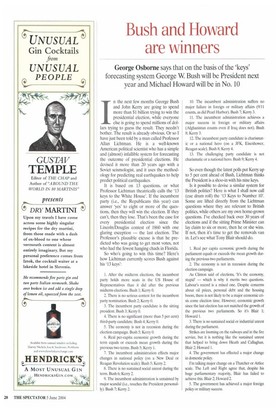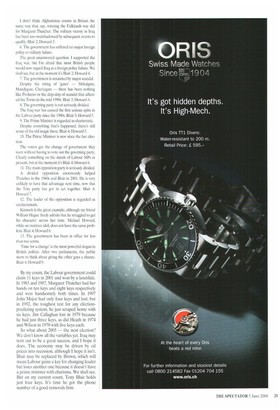Bush and Howard are winners
George Osborne says that on the basis of the 'keys' forecasting system George W. Bush will be President next year and Michael Howard will be in No. 10 In the next few months George Bush and John Kerry are going to spend more than $1 billion trying to win the presidential election, while everyone else is going to spend millions of dollars trying to guess the result. They needn't bother. The result is already obvious. Or so I have just been told by a man called Professor Allan Lichtman. He is a well-known American political scientist who has a simple and (almost) infallible system for forecasting the outcome of presidential elections. He devised it more than 20 years ago with a Soviet seismologist, and it uses the methodology for predicting real earthquakes to help predict political earthquakes.
It is based on 13 questions, or what Professor Lichtman theatrically calls the '13 keys to the White House'. If the incumbent party (i.e., the Republicans this year) can answer 'yes' to eight or more of the questions, then they will win the election. If they can't, then they lose. That's been the case for every presidential election since the Lincoln/Douglas contest of 1860 with one glaring exception the last election. The Professor's plausible excuse is that he predicted who was going to get most votes, not who had the fewest hanging chads in Florida.
So who's going to win this time? Here's how Lichtman currently scores Bush against his '13 keys':
1. After the midterm elections, the incumbent party holds more seats in the US House of Representatives than it did after the previous midterm elections. Bush 1; Kerry 0.
2. There is no serious contest for the incumbent party nomination. Bush 2; Kerry 0.
3. The incumbent party candidate is the sitting president. Bush 3; Kerry 0.
4. There is no significant (more than 5 per cent) third-party candidate. Bush 4; Kerry 0.
5. The economy is not in recession during the election campaign. Bush 5; Kerry 0.
6. Real per-capita economic growth during the term equals or exceeds mean growth during the previous two terms. Bush 5; Kerry 1.
7. The incumbent administration effects major changes in national policy (on a New Deal or Reagan Revolution scale). Bush 5; Kerry 2.
8. There is no sustained social unrest during the term. Bush 6; Kerry 2.
9. The incumbent administration is untainted by major scandal (i.e., touches the President personally). Bush 7; Keny 2. 10. The incumbent administration suffers no major failure in foreign or military affairs (9/11 counts, as did Pearl Harbor), Bush 7; Kerry 3.
11. The incumbent administration achieves a major success in foreign or military affairs (Afghanistan counts even if Iraq does not). Bush 8; Kerry 3.
12. The incumbent party candidate is charismatic or a national hero (on a JFK, Eisenhower, Reagan scale). Bush 8; Kerry 4.
13. The challenging party candidate is not charismatic or a national hero. Bush 9; Kerry 4.
So even though the latest polls put Kerry up to 5 per cent ahead of Bush, Lichtman thinks the President is a shoo-in with his nine keys.
Is it possible to devise a similar system for British politics? Here is what I shall now call (cue drum roll) the '13 Keys to Number 10'. Some are lifted directly from the Lichtman questions where they are relevant to British politics, while others are my own home-grown questions. I've checked back over 30 years of elections and if the sitting Prime Minister can lay claim to six or more, then he or she wins. If not, then it's time to get the removals van in. Let's see what Tony Blair should do.
1. Real per capita economic growth during the parliament equals or exceeds the mean growth during the previous two parliaments.
2. The economy is not in recession during the election campaign.
As Clinton said of elections, It's the economy, stupid' which is why it merits two questions. Labour's record is a mixed one. Despite concerns about oil prices, personal debt and the housing boom, there is not likely to be a major economic crisis come election time. However, economic growth since the last election has not matched the growth of the previous two parliaments. So it's Blair 1; Howard 1.
3. There is no sustained social or industrial unrest during the parliament.
Strikes are looming on the railways and in the fire service, but it is nothing like the sustained unrest that helped to bring down Heath and Callaghan. Blair 2; Howard 1.
4. The government has effected a major change in domestic policy.
I'm talking major change on a Thatcher or Attlee scale, The Left and Right agree that, despite his huge parliamentary majority, Blair has failed to achieve this. Blair 2; Howard 2.
5. The government has achieved a major foreign policy or military success. I don't think Afghanistan counts in Britain the same way that, say, winning the Falklands was did for Margaret Thatcher. The military victory in Iraq has been too overshadowed by subsequent events to qualify. Blair 2; Howard 3.
6. The government has suffered no major foreign policy or military failure.
The great unanswered question. I supported the Iraq war, but I'm afraid that most British people would now regard Iraq as a foreign policy failure. We shall see, but at the moment it's Blair 2; Howard 4.
7. The government is untainted by major scandal.
Despite the string of gates' — Mittalgate, Mandygate, Chcriegate — there has been nothing like Profumo or the drip-drip of scandal that affected the Tories in the mid 1990s. Blair 3; Howard 4.
8. The governing party is not seriously divided. The Iraq war has caused the first serious splits in the Labour party since the 1980s. Blair 3; Howard 5.
9. The Prime Minister is regarded as charismatic. Despite everything that's happened, there's still some of the old magic there. Blair 4; Howard 5.
10. The Prime Minister is new since the last election.
The voters get the change of government they want without having to vote out the governing party. Clearly something on the minds of Labour MPs at present, but at the moment it's Blair 4; Howard 6.
11. The main opposition party is seriously divided.
A divided opposition enormously helped Thatcher in the 1980s and Blair in 2001. He is very unlikely to have that advantage next time, now that the Tory party has got its act together. Blair 4; Howard?.
12. The leader of the opposition is regarded as uncharismatic.
Kinnock is the great example, although my friend William Hague freely admits that he struggled to get his character across last time. Michael Howard, while no matinee idol, does not have the same problem. Blair 4; Howard 8.
13. The government has been in office for less than two terms.
'Time for a change' is the most powerful slogan in British politics. After two parliaments, the public starts to think about giving the other guys a chance. Blair 4; Howard 9.
By my count, the Labour government could claim 11 keys in 2001 and won by a landslide. In 1983 and 1987, Margaret Thatcher had her hands on ten keys and eight keys respectively and won handsomely both times. In 1997 John Major had only four keys and lost; but in 1992, the toughest test for any electionpredicting system, he just scraped home with six keys. Jim Callaghan lost in 1979 because he had just three keys, as did Heath in 1974 and Wilson in 1970 with five keys each.
So what about 2005 — the next election? We don't know all the variables yet. Iraq may turn out to be a great success, and I hope it does. The economy may be driven by oil prices into recession, although I hope it isn't. Blair may be replaced by Brown, which will mean Labour gains a key for changing leader but loses another one because it doesn't have a prime minister with charisma. We shall see. But on my current count, Tony Blair holds just four keys. It's time he got the phone number of a good removals firm.











































































 Previous page
Previous page